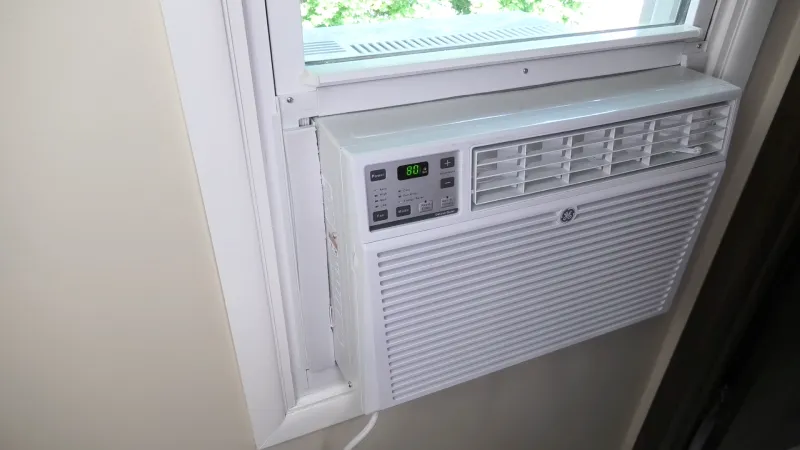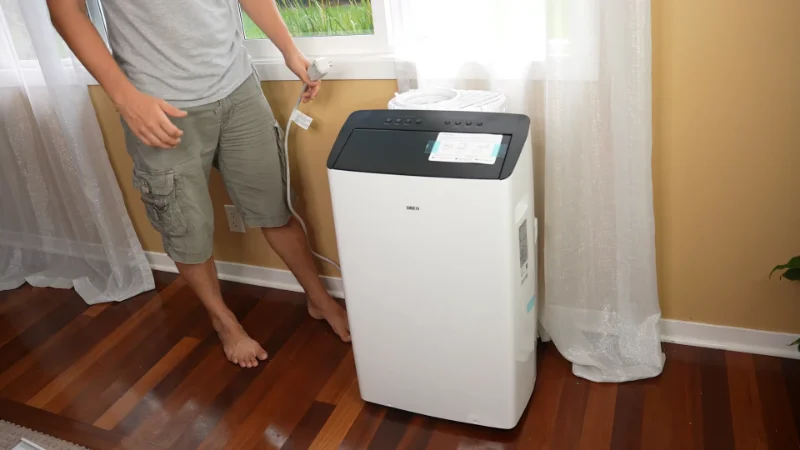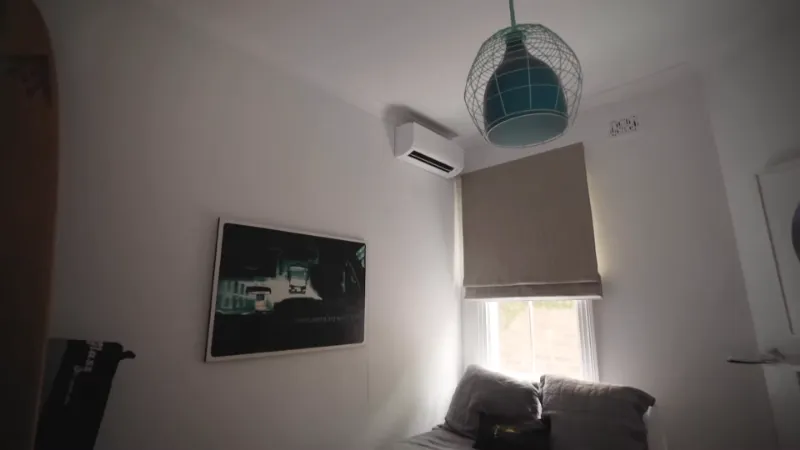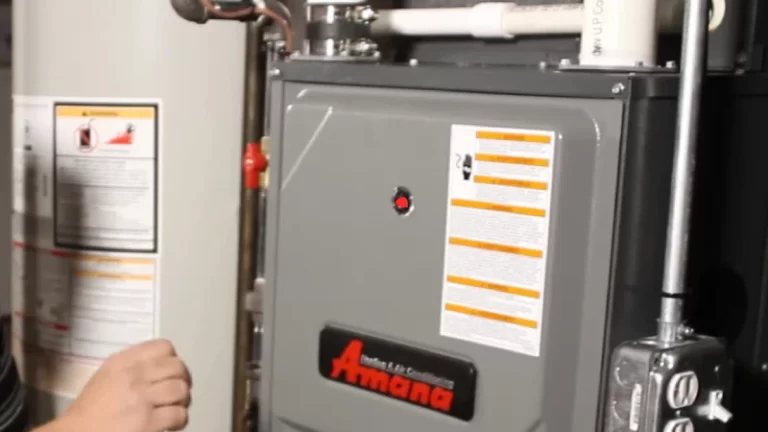Does Air Conditioner Make You Cough?

Many people experience coughing when they enter a room with an air conditioner. While it may seem like the air conditioner is causing your cough, this is not necessarily the case. In this article, we will explore the various possible causes of coughing when an air conditioner is present and provide some tips on how to prevent it.
You'll Learn About
Does Air Conditioner Make You Cough?
Coughing when using an air conditioner is usually caused by a combination of factors, including dry air, dust, and airborne irritants. Dry air can irritate the throat and airways, causing them to become inflamed and irritated.
Dust particles can also cause inflammation and irritation, resulting in coughing. Additionally, airborne irritants such as pollen and dust mites can trigger an allergic reaction, leading to coughing and other respiratory symptoms.
How to Reduce Coughing From an Air Conditioner
There are several steps you can take to reduce coughing from an air conditioner. First, invest in a good air filter and regularly change it to remove dust and other irritants from the air. Additionally, increase the humidity in the room by using a humidifier or by placing bowls of water near the AC unit.
This will help to keep the air moist, reducing inflammation and irritation. Lastly, avoid using scented products near the AC unit, as these can also act as irritants.
What to Do if You Are Still Coughing
If you find that you are still coughing after taking the steps above, it may be time to see a doctor. A doctor can help to determine the cause of your coughing and provide treatment or medication to help alleviate your symptoms.
They may also be able to recommend other treatments, such as a nasal spray or inhaler, to help ease the coughing.
Are Air Conditioners Bad for Your Health
In general, air conditioners are not bad for your health. In fact, they can actually help to improve your health by filtering out irritants and providing cool, clean air. However, it is important to use the air conditioner correctly and regularly maintain it to ensure that it is running optimally.
Regularly change the filter, keep the vents clean, and ensure that the AC is not too cold or too hot.
In conclusion, air conditioners can cause coughing if not properly maintained and used correctly. To reduce coughing, ensure that you are using a good quality air filter, increasing the humidity in the room, and avoiding using scented products near the AC unit.
If these steps do not help, then it is important to seek medical help. Air conditioners are not bad for your health, but it is important to use them correctly and regularly maintain them to ensure optimal performance.
Does a Fan or AC Make You Cough?
Yes, a fan or air conditioner (AC) can make you cough. Dry air can irritate your throat and nasal passages, leading to coughing fits. In addition, circulating dust mites and other allergens can also trigger coughing.

How to Reduce Coughing Caused by Fans and Acs
Humidifiers can be used to add moisture to the air, reducing the irritation that can lead to coughing. Additionally, regular air filter changes and air purifier use can help reduce the circulation of dust mites and other allergens.
What Other Factors Can Cause Coughing
In addition to dry air from fans or ACs, a variety of other factors can cause coughing. These include exposure to smoke, dust, pollution, or other irritants; infections such as colds, bronchitis, or pneumonia; or allergies.
What Are the Symptoms of a Cough
The symptoms of a cough vary depending on what is causing it. Common symptoms include a dry hacking sound, chest discomfort, shortness of breath, and sore throat. In some cases, coughing up phlegm may occur.
When Should You See a Doctor
If your coughing persists despite home remedies, or if it is accompanied by other symptoms such as fever, chest pain, or bloody mucus, you should see your doctor as soon as possible. Your doctor can help you determine the cause of your cough and provide you with the most effective treatment.
Can Ac Cause Congestion and Cough?
Air conditioners can cause congestion and coughing due to the sudden change in temperature and humidity levels. When a person moves from a warm to a cold environment, the body can react by producing a histamine response.
This causes the blood vessels in the nose to swell, resulting in congestion, and can also trigger coughing. In addition, the dry air produced by air conditioners can further irritate the airways, resulting in coughing.

Who is at Risk
Anyone can experience congestion or coughing due to air conditioning, but some people may be more prone than others. Those with asthma or allergies may be more likely to suffer from ac-related congestion and coughing, as their airways are already more sensitive.
Children and the elderly may also be more susceptible, as their immune systems are not as strong.
How to Reduce Ac-related Congestion and Coughing
To reduce ac-related congestion and coughing, it is important to keep the air in the room as clean and moist as possible. This can be done by regularly changing the air filters on the air conditioner and using a humidifier.
It is also important to avoid sudden changes in temperature, as this can trigger a histamine response.
Are There Any Other Solutions
If the above measures do not help reduce ac-related congestion and coughing, there are other solutions that may help. Nasal sprays, decongestants, and antihistamines can be taken to reduce histamine production and help relieve congestion and coughing.
In addition, avoiding allergens and irritants in the air can also help reduce symptoms.
When to See a Doctor
If ac-related congestion and coughing persist or become severe, it is important to see a doctor. In some cases, allergy testing may be needed to identify the cause of the symptoms. In addition, if the symptoms are accompanied by chest pain or difficulty breathing, these could be signs of a more serious condition and medical attention should be sought immediately.
Why Do I Cough After Conditioning?
Exercise-induced asthma (EIA) is a respiratory condition triggered by physical activity, such as running, biking, and swimming. It is also known as exercise-induced bronchoconstriction (EIB). During physical activity, the airways constrict and produce mucus, leading to coughing, wheezing, chest tightness, or shortness of breath.
People with asthma are more likely to experience EIA.
What Causes Coughing After Exercise
Coughing after exercise is typically caused by EIA. During physical activity, the airways narrow due to changes in temperature and humidity, which can cause the airways to constrict and produce more mucus.
This mucus can irritate the airways, leading to coughing. Other factors, such as air pollution, may also contribute to coughing after exercise.
How Can I Avoid Coughing After Exercise
There are several strategies that can help reduce or prevent coughing after exercise. Warm-up exercises help to prepare the body for physical activities and can help reduce the likelihood of experiencing EIA.
Additionally, using an inhaler 15 minutes before and after exercise can help reduce coughing. Finally, avoiding outdoor exercise on days with high levels of air pollution can help prevent coughing.
What Are the Treatments for Coughing After Exercise
Treatment for coughing after exercise includes medications and lifestyle modifications. Short-acting bronchodilators and anti-inflammatory medications help to open the airways and reduce inflammation, which can help reduce coughing.
Additionally, avoiding certain triggers, such as cold air or allergens, can also help reduce coughing.
When Should I See a Doctor
If coughing persists after trying home remedies, it is important to see a doctor. Coughing could be a sign of a more serious health condition, such as asthma or a respiratory infection. Additionally, a doctor can help identify triggers of EIA and suggest lifestyle modifications or medications to help reduce coughing after exercise.
Can Ac Damage Lungs?
Air conditioning can cause airway alterations which can lead to respiratory illness. Such pre-existing conditions as asthma can worsen when exposed to very cold air from air conditioning. Exposure to air conditioning can cause inflammation and irritation of the respiratory tract.
This can lead to coughing and wheezing, and difficulties in breathing. Long-term exposure to air conditioning can worsen pre-existing lung conditions. It can also cause severe health problems such as bronchitis, pneumonia and COPD.
Air conditioning can lead to dehydration, which can further damage the lungs. Dry air can also cause respiratory illnesses such as sinusitis and rhinitis. Air conditioning can increase the risk of allergies and infections.
Therefore, it is important to maintain proper hygiene and ventilation to prevent air conditioning from damaging the lungs.
Can Ac Cause Sore Throat and Cough?
Air conditioners can cause a sore throat and cough due to the dry air they produce. Low humidity levels in the air can irritate your throat and cause coughing. Allergy sufferers are particularly vulnerable to this type of irritation.
Runny noses, itchy eyes and sneezing can all be caused by air conditioners. If your symptoms persist, it may be time to see a doctor. Keeping your home humidified can help reduce symptoms. Use a humidifier to add moisture to the air in your home.
If you can, open windows to let in some outside air. This will help to keep the air in your home from becoming too dry. Keeping your air conditioner clean and well maintained will also help reduce symptoms.
Can Ac Cause a Deep Chest Cough?
AC can cause a deep chest cough due to the dry air it circulates. This type of cough is usually caused when the airways constrict due to big gusts of wind from the AC. It is more likely to occur during allergy season, when people are spending more time outdoors and the weather is warmer.
This type of cough is a common symptom of allergies, but it can also be caused by AC. It is important to keep the AC on a lower setting, as this can help reduce the risk of a deep chest cough. Also, people should make sure the AC is regularly serviced to ensure it is functioning properly.
Keeping the air clean in the home can also help reduce the risk of a deep chest cough. This can be done by regularly vacuuming and dusting, as well as keeping pets away from the AC. It is also important to keep windows and doors closed to prevent allergens from entering the home.
Finally, it is important to seek medical help if the deep chest cough persists, as it may be a sign of a more serious underlying condition. Window AC issues aren’t also common.
To Recap
Coughing when an air conditioner is present is a common issue that affects many people. Fortunately, there are many potential causes for this phenomenon and there are steps you can take to prevent it from happening.
Being aware of possible causes and taking steps to reduce exposure to irritants can help to reduce coughing when you are in a room with an air conditioner.

